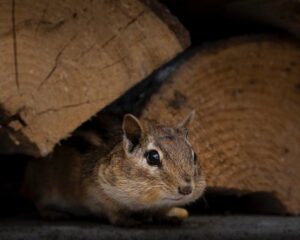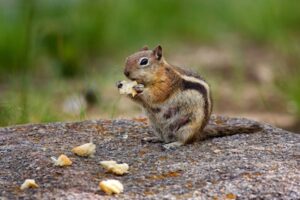Natural Methods for Getting Rid of Chipmunks
If you’re looking for the best natural ways to get rid of chipmunks in your yard, this article is for you! Chipmunks are small rodents that are known for their striped backs and cheek pouches, which is where they put all of the food that they collect when out foraging. They also love being around people so you will often find them in your backyard or in your garden laying in wait to have their next meal.
So, how do you get rid of chipmunks naturally? A few ways to naturally get rid of chipmunks include:
- Keeping your lawn and garden free of debris
- Fencing your garden
- Using mesh screens
- Placing obstacles around your garden
Keep reading to learn more about chipmunks and how to use natural methods to keep them out of your garden and lawn!
Chipmunks Are Reproducing Experts
 Chipmunks reproduce quickly because females can have up to five litters per year with anywhere between four and six young.
Chipmunks reproduce quickly because females can have up to five litters per year with anywhere between four and six young.
Chipmunk pups and adults both look very similar except the juveniles have tails that are shorter than half an inch at birth.
Fully mature animals, on the other hand, have tails with a full one-inch length.
These animals like to make their homes underneath things where it is warm like woodpiles, under roots of trees, or beside stones so it’s important to keep these areas clear if you want to prevent chipmunks from gaining access.
Problems Caused by Chipmunks
Do chipmunks harm property or cause damage? The short answer is yes. Chipmunks are problematic when they try to make themselves at home in your yard, garden, or inside your house.
The long answer requires a little more explanation. Let’s start with the basics: what exactly are chipmunks? As a reminder, chipmunks are small rodents native to North America that look like scaly squirrels without tails.
They’re well known for their striped appearance and their habit of storing food in their cheeks for later consumption. Here are 3 primary consequences that chipmunks produce.
Pest Attractors
 As cute as these critters may be, they’re considered a pest by many homeowners. This is because they’ll burrow into just about anything – bird feeders, flowerpots – you name it!
As cute as these critters may be, they’re considered a pest by many homeowners. This is because they’ll burrow into just about anything – bird feeders, flowerpots – you name it!
Because chipmunks are vegetarians, they often hide their food in your yard. This means that if you have one living under your shed or porch, then all sorts of pests will be drawn to it.
This can include other rodents like rats and mice, or even larger animals like raccoons.
Unwanted House Guests
Additionally, chipmunks may live inside the walls of your house. They do this because it’s safer from predators (they’re small enough to fit through tiny cracks) and also because they need a place where the temperature remains fairly stable year-round.
If you hear noises coming from inside your wall, then don’t panic. As long as no holes are leading into the interior of your home, then it’s unlikely that you have an infestation. Chipmunks are perfectly content living under a shed or a porch, which means that if your property has the right environment then you may never even see them!
Damage to Plants
Of course, sometimes they do have to leave their burrows in search of food. This is when they’re most likely to chew on wires, eat flower bulbs and herbs from your garden, and make themselves comfortable atop mulch piles.
In other words, they can cause a lot of damage! You also need to be careful around plants if they’ve been eating from them regularly. If chipmunks have been nibbling on garlic mustard plants for example, then those plants will become poisonous. It’s not always easy to tell whether you have a chipmunk problem so here are some signs to discern.
5 Telltale Signs of Chipmunks On Your Property
- Chipping sounds will be heard in the attic or walls of your home. Chipmunks have a distinctive chirping sound that is very different from other rodents. If you suspect you have chipmunks nearby, wait until dusk and listen for them as they come out of their nests to look for food.
- Another way to know if you have chipmunks is to see if you have small, round holes in the ground everywhere from where they are digging new burrows. These signs will likely not appear too far away from where the chipping noises are coming from because this is usually how close they live to one another.
- They also leave half-eaten nuts and other small food items in the areas surrounding their nests. If you notice these signs, look under rocks or around woodpiles to find where they are nesting.
- Trails made out of sawdust (or dirt-like material) will be seen if the chipmunks are frequently running through certain areas of your yard. These trails can lead to entrances to their nests.
- If all else fails just check for squirrels! Squirrels can sometimes be confused with chipmunks but they are not as likely because chipmunks eat nuts and seeds rather than just plant material like squirrels do.
Natural Solutions to Getting Rid of Chipmunks
There are several things that you can do on your own to keep these animals out of your yard and gardens.
Keep Garden and Flowerbeds Free of Debris
It’s important to keep your yard looking as neat as possible, as chipmunks like to make their homes in such areas where they can go undetected by predators.
If you don’t want a chipmunk living under your porch or deck, make sure those areas are clear of debris and clutter, and use trellis netting to prevent the chipmunk from climbing up underneath.
Consider Fencing Off Your Garden
Fencing is an excellent way to keep chipmunks out of your yard because it creates a barrier that the little critters will not be able to pass through easily. Chipmunks can squeeze into surprisingly small spaces so anything that you put around the area that you want to be chipmunk-free is money well spent.
Exclude Them Using Mesh Screens
Using commercial-grade mesh screens around the areas that you don’t want chipmunks in is one of the best ways to keep them out. This method may require a bit more time, but it’s worth it because chipmunks are very persistent when they decide on taking up residence in someplace familiar.
Place Obstacles Along Their Routes
Chipmunks use smell and touch to navigate just like any other animal does. Something as simple as placing small sticks across an area where they normally enter and exit can prevent them from entering your yard entirely just by getting stuck on the obstacle while trying to get through.
Use of Natural Predators
Chipmunks are preyed upon by a variety of animals, especially larger ones like foxes and coyotes. You can simply let nature take its course by capturing or killing these predators in your area.
You can also create man-made obstacles to keep predators away from certain areas that you want to be protected by installing fencing around the perimeter of your yard with wide mesh screens covering the top to prevent raptors from swooping in for lunch when they’re not supposed to.
Scent Deterrents
Chipmunks have very sensitive noses. Because of this, using things like ammonia or peppermint oil in an area where they are can keep them away because it makes the area inhospitable.
You can also use commercial grade deterrents or organic deterrents for this purpose, but either way, it’s a good idea to wait until after dark so they don’t pick up on what you’re doing and avoid the area altogether.
Remove Food Sources
 Chipmunks love being around people because that means easy access to food scraps in your trash or pet food left outdoors, for example.
Chipmunks love being around people because that means easy access to food scraps in your trash or pet food left outdoors, for example.
If there is one thing that chipmunks are not shy about, it’s access to tasty treats, so clean up all of your outdoor areas regularly and be sure to store any perishable foods indoors when they aren’t in use.
Prevention Though Physical Exclusion
Chipmunks can climb up and down just about anything. It’s important to prevent them from gaining access to your yard but also make sure that other animals cannot gain access as well.
This can be done by using fencing or screens. Keeping an area enclosed will prevent potential invaders from entering and leaving, keeping both out of the picture for good.
Natural Repellents
There are a variety of organic or natural repellents you can use in your backyard such as sprinkling cayenne pepper around the perimeter (but not on plants), leaving mint leaves out overnight (which chipmunks do not like), or planting certain types of flowers that repel chipmunks because they don’t like the smell (geraniums).
Other repellant options include electronic, liquid, and dry repellents that may help if these natural solutions are not effective.
Other Chipmunk Prevention Options
Overall, if you want to protect your landscaping then it’s best to avoid leaving out food that chipmunks would enjoy. If you absolutely can’t do that, then make sure to clean up the area immediately after the animals finish their meal.
If all else fails, you can try to scare away troublesome rodents with devices that produce loud noises. This will work only if you’ve already used stronger-smelling methods. One way or another, though, you should be able to keep them away if your property isn’t ideal for these small rodents!
